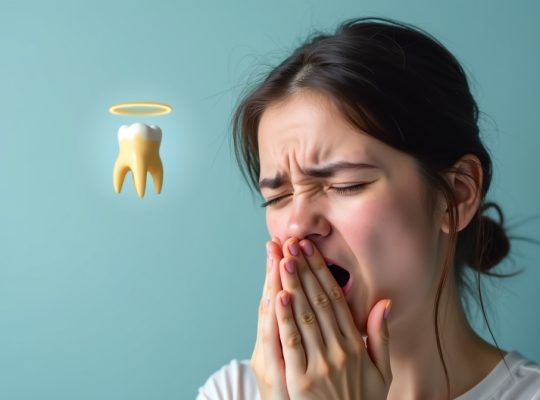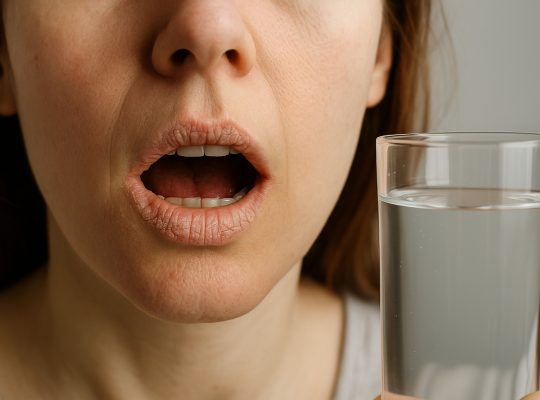It happens to the best of us: a sudden bite on something hard, a slip, or maybe even an unexpected accident, and there it is—a cracked or chipped tooth. It can feel like a moment of panic. What do you do? How serious is it? Can you fix it on your own? The answer might surprise you. Cracked or chipped teeth are more common than you think, and while they can be alarming, they don’t always mean disaster. Knowing what to do in the heat of the moment can help protect your smile, ease your mind, and get you the right treatment.
Stay Calm and Assess the Damage
If you find yourself dealing with a cracked or chipped tooth, the first thing you need to do is stay calm. In most cases, cracked teeth don’t come with immediate danger, but knowing how to assess the damage is important. You’ll want to consider how much of the tooth has been chipped or cracked. Is it just a minor chip, or is there a deeper crack? Understanding the severity will guide your next steps.
Minor Chips and Cracks: Not All Are a Big Deal
For small chips, you might not need to worry too much. These types of chips are usually not painful, and they may not cause further damage. But even a small crack can lead to complications if left unchecked. Sometimes, these issues can worsen if not addressed, so it’s important to keep an eye on it. Don’t panic. Instead, take a moment to assess how bad the damage is and move forward accordingly.
What to Do Immediately After the Incident
If you’ve cracked or chipped your tooth, taking some immediate steps can help prevent further damage and reduce any discomfort. Here are some things to keep in mind:
- Clean the Area: Gently rinse your mouth with warm water. This will help remove any food particles or debris and keep the area clean.
- Apply Cold Compress: If you’re experiencing pain, a cold compress can help reduce swelling and ease any discomfort. Hold it against your cheek near the affected area for about 15 minutes.
- Avoid Hard Foods: While your tooth is damaged, stay away from hard foods or anything that could further stress the tooth.
- Take Over-the-Counter Pain Relief: If you’re in pain, taking over-the-counter pain relievers like ibuprofen can help manage discomfort until you can see a dentist.
Get in Touch with a Dentist as Soon as Possible
Time is an important factor when dealing with a cracked or chipped tooth. Even if it doesn’t hurt right away, it’s essential to reach out to your dentist as soon as you can. Some cracks may worsen over time or lead to infections if not treated. Your dentist can evaluate the damage and decide if any treatments are needed. In the meantime, don’t delay calling for an appointment or seeking professional help.
When You Should Seek Emergency Dental Care
Not all cracked or chipped teeth need emergency care, but there are certain signs that indicate you should seek immediate attention:
- Severe Pain: If your cracked tooth is causing intense pain, it’s a sign that the damage might have reached deeper layers of the tooth, such as the pulp.
- Sharp Edges: If the crack has left sharp edges that are cutting into your tongue, cheek, or gums, immediate attention is needed.
- Visible Fracture of the Tooth: If the crack or chip has caused a visible fracture down the middle of your tooth, this could mean the tooth is at risk of further breaking.
- Signs of Infection: Pain, swelling, or pus coming from the affected area can signal that an infection has set in, which requires urgent care.
How a Dentist Will Treat a Cracked or Chipped Tooth
Once you’ve seen a dentist, they will determine the best course of treatment based on the severity of the damage. Depending on how much damage your tooth has sustained, there are a few different approaches they might take:
Fillings and Bonding for Minor Chips
For small chips and cracks, dental bonding can be a quick and simple fix. The dentist will use a tooth-colored resin to fill in the chip or crack, restoring the tooth’s natural appearance and function. This treatment is typically pain-free and only requires one visit.
Crowns for Larger Cracks
If the crack is larger or the tooth has become weak, your dentist may suggest a crown. A crown is a cap that fits over the tooth to restore its shape, size, and strength. Crowns are often made of porcelain or metal and are custom-fitted to your tooth.
Root Canals for Severe Damage
If a crack or chip extends deep enough to affect the pulp of the tooth, a root canal may be necessary. This procedure removes the damaged or infected tissue from inside the tooth. The tooth is then sealed and often covered with a crown to protect it.
Veneers for Cosmetic Fixes
In cases where the damage is mostly cosmetic, such as a visible chip, your dentist might suggest veneers. Veneers are thin shells that cover the front of your teeth, making them look natural and flawless.
Prevent Further Damage: Do’s and Don’ts After a Cracked Tooth
While you’re waiting to see the dentist, there are a few things you can do to prevent further damage to your cracked or chipped tooth. Here’s what you should avoid and what you should do:
Do:
- Use a Soft-Bristled Toothbrush: If you have a cracked tooth, using a soft-bristled toothbrush can help avoid irritation to the area. Brush gently to avoid any unnecessary pressure on the tooth.
- Avoid Stressing the Tooth: Don’t chew on the side of your mouth with the damaged tooth. This can prevent further stress or breakage.
- Protect the Tooth at Night: If you’re prone to grinding your teeth at night (a condition known as bruxism), ask your dentist about a mouthguard to protect your teeth.
Don’t:
- Eat Hard Foods: This includes chewing on ice, hard candies, or anything that could put more pressure on the damaged tooth.
- Neglect the Damage: Even if the crack or chip doesn’t hurt, ignoring it can cause more damage down the line. It’s better to get it checked out early.
- Ignore Symptoms: If you notice new pain, swelling, or other changes in your tooth, don’t wait to see the dentist. These could indicate an infection or further damage.
How to Prevent Cracked or Chipped Teeth in the Future
While you can’t always prevent accidents from happening, there are steps you can take to reduce the risk of cracking or chipping your teeth. Here are a few tips:
- Wear a Mouthguard: If you play sports or grind your teeth at night, a mouthguard can protect your teeth from damage.
- Avoid Chewing Hard Objects: Ice, pens, or anything else that could cause a chip should be avoided.
- Eat Carefully: Be mindful when eating tough foods like hard nuts or crusty bread. Cutting them into smaller pieces can reduce the risk of biting down too hard.
Final Thoughts
Cracking or chipping a tooth can be a stressful experience, but it doesn’t always have to be a catastrophe. By staying calm and following the steps above, you can ensure that you protect your tooth from further damage and get the treatment you need. Always remember that visiting the dentist is key to maintaining your oral health, and the sooner you address the issue, the better the chances are for a smooth recovery.
A little care, a bit of attention, and a quick visit to your dentist can keep your smile looking its best. Don’t let a cracked or chipped tooth hold you back—take the right steps, and you’ll be back to your normal self in no time!






